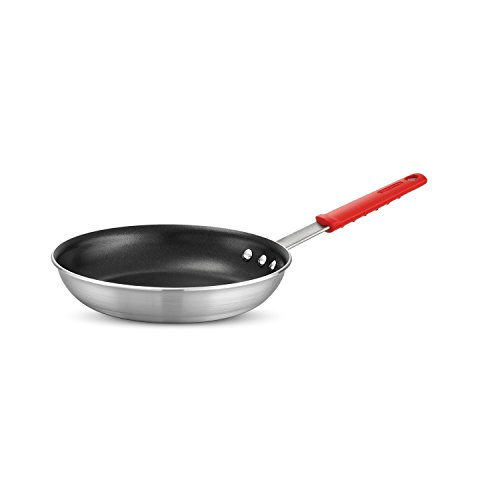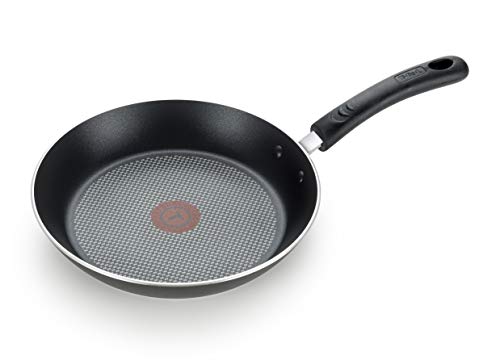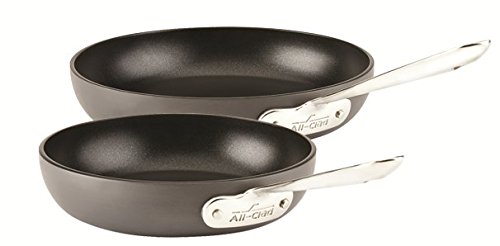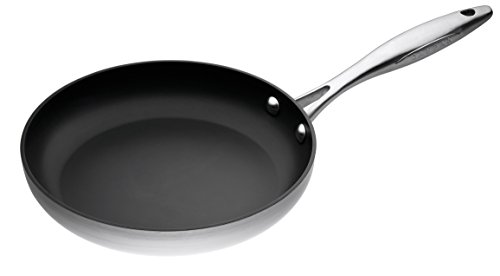Nonstick pans are usually flat, circular cookware that all households often use when cooking various dishes. They're typically your first go-to kitchen tool to cook your favorite breakfast. Being one of the most hyped cookware, you can easily spend way too much on a quality pan.
So, If you are confused or tight on a budget, this in-depth article will guide you to the best nonstick pan suited for your needs without breaking the bank.
Pros of Nonstick Cookware
Aside from using less oil, here are some of the benefits you can expect from nonstick pots and pans that are completely evident especially compared to using other types of cookware.
Less oil, Less cholesterol
This is one of the most significant advantages of using nonstick cookware. It allows you to use little to no oil by simply relying on the natural oil and fat that are already present in most foods (good cholesterol) like vegetables and meat which is very healthy.
It makes cooking easy and fun
I personally love cooking my own meals but sometimes it can be a hideous task with low-quality cookware. The smooth surface of the nonstick pan allows you to slide the food easily and start practicing some of the chef’s skills which makes you enjoy the whole cooking experience on another level.
You don’t have to switch pans often
A lot of nonstick pans are manufactured to suit most of the consumer's needs. They are versatile in a way that you can use them on most heat sources to cook various recipes in different cooking styles.
They are easy to clean and maintain
While most nonstick pans are not dishwasher-safe, they are still very easy to clean thanks to the nonstick coating which prevents most food from sticking. However, cleaning the riveted handles can be a bit tricky compared to the interior.
A lot of them are affordable and of good quality
There’s a wide variety of inexpensive cookware in the market that are usually affordable and of good quality. The overall price of nonstick pots and pans depends mainly on the nature and quality of the coating plus how many layers of the coating are applied.
Cons of Nonstick Cookware
As good as this type of cookware may be, it is still not perfect in every sense. Here are the four main downsides of nonstick cookware that you need to be aware of:
The safety and quality of the coating
This is where it can get a bit tricky for some people, all brands use their own technologies in specific construction methods to create their nonstick cookware. However, some of them choose to not disclose any sort of information about the pretreatment as well as the nature of their nonstick coating which makes me doubt their qualities even further. That being said, most companies produce safe nonstick pans that are absolutely PFOA-free and FDA certified. But, if you are looking for more of greener choices then you can go for brands such as GreenPan and Greenlife.
Less nonstick layers
Most of the trusted brands coat their cookware with at least 3 nonstick layers to ensure high durability and great smooth quality. That being said, some brands prefer to stick to only 2 layers.
Sensitive surface
Nonstick coating can easily be scratched or damaged, that’s why it is very important to never use any type of metal utensils or dishwasher to preserve the shape and quality of the coating.
Nonstick warranty
Nonstick pots and pans are prone to degrade over time, you can expect great smooth performance for around 3 to 5 years from high-quality cookware. However, some brands do not include any type of warranties for their products while some have only a 1-year limited warranty.
Are Nonstick Pans a Must?
Nonstick cookware is a trend these days, they offer a lot of features that can facilitate your cooking and cleaning tasks to save you a lot of time. However, they are not a must-have for every cook. You can basically use any type of pan, whether it’s a ceramic frying pan, a carbon steel pan, a stainless steel pan, or even a cast iron skillet to cook any desirable recipe and achieve the same results as you would with nonstick pans.
Popular Nonstick Materials
Back in the day, Teflon (PTFE) was the primary go-to material for most brands. However, due to the gases released once this material reaches certain temperatures, it started to pose more health risks that could affect home cooks and their pets. Hence, a lot of manufacturers started relying on different materials instead to craft their non-toxic cookware that could provide superior nonstick quality than Teflon.
Ceramic or Porcelain
Ceramic is considered to be one of the most non-toxic materials used in producing nonstick coatings. It is durable, very eco-friendly, and safe to cook with at any temperature since basically there will be no toxic fumes to worry about.
Pyroceram
Probably the best heat-resistant glass-ceramic. It is naturally nonstick and is very good for cooking. It holds heat pretty well and takes more time to cool off than regular cookware.
Hard-anodized Aluminum
This is one of the most popular construction methods companies relies on to produce their nonstick pans. A combination between anodized aluminum and stainless steel where the cookware will be able to offer the resistance and durability of stainless steel and the superb performance of aluminum while maintaining excellent nonstick quality.
Hybrid Stainless steel
Stainless steel is a good conductor of heat but it’s often used as a “shield” since it offers high rust and corrosion resistance. However, food will stick to surfaces made of this material. That’s why very few use stainless steel in hybrid constructions such as Hexclad to produce cookware that has great nonstick quality protected with the resistance and durability of stainless steel. See Misen vs Hexclad comparison for more information.
Titanium
Titanium is usually infused with other metals like aluminum or steel when being used for cookware since it is non-magnetic and is very poor in conducting heat and electricity but is very safe to cook with. However, titanium cookware are usually a bit costlier compared to cookware made of other nonstick materials.
Aluminum
The only bad thing about using pure aluminum is that it reacts to acids present in fruits and vegetables which makes it unsafe to directly get in contact with the food. That’s why it’s never used as the surface and is commonly anodized to be used as the core since it is a very good conductor of heat whose thermal conductivity is 16 times higher than stainless steel.
Best Nonstick Pans For The Money
Tramontina Professional Nonstick Pan
Made with a reinforced PFOA-free eclipse nonstick interior, the Tramontina Professional nonstick pan features sturdy stainless steel riveted handle covered with a soft silicone sleeve to secure a very comfortable yet safe hold during cooking.
The heavy-gauge aluminum distributes the heat quickly and evenly which helps you to cook any meal perfectly whether on stoves or inside ovens.
This Tramontina cookware is dishwasher-safe however, I highly recommend you to stick to handwashing since it’s so easy to clean and more importantly to preserve its nonstick coating for as long as possible. Keep in mind that nonstick pans are replaceable over time however with proper care and maintenance, they can last for more than 5 years.
As for its versatility, this pan can deliver and maintain an excellent performance to cook and master any type of pan-fried recipe. Just be careful not to overheat it, and always cook on low to medium heat settings.
PROS
CONS
T-fal Professional Nonstick Pan
This pan is perfect for beginners who love home cooking and wish to learn and test out various recipes. It has a unique thermo-spot heat indicator that provides a signal when the pan is ready for cooking.
T-Fal’s pan holds up nicely through regular wear and tear conditions. Its ergonomic riveted silicone handle keeps it balanced for an easy, sturdy grip. The surface is coated with titanium to offer smooth nonstick quality with great durability. However, it is still not strong enough to withstand dishwashers or the use of metal utensils. Silicone or wooden utensils are recommended to not scratch the coating. That being said, It’s easy to clean the whole cookware.
PROS
CONS
Cuisinart MultiClad Pro Nonstick Pan
Due to its unique multi-clad feature, this Cuisinart nonstick pan is one of the best cookware for glass top stoves on my list. It has a triple-ply construction where the aluminum core is covered with stainless steel layers to secure high performance and durability.
As I have covered in the All-Clad vs Cuisinart comparison, this brand combines its Quantanium coating that enhances the durability even further without sacrificing the nonstick quality with its “Heat Surround™” technology that allows the heat to be distributed evenly throughout the pan. You can expect great performance for years to come.
The brushed exterior makes it easier for you to clean and maintain the cookware. However, It can have minor scratches over time if you use metal utensils often.
The handle is lightweight and features two open areas at every end to help disperse the heat to sustain a cool, safe grip while cooking. Compared to other brands, I find Cuisinart does a better job in creating comfortable handles that are suited for every cook.
PROS
CONS
All-Clad Ha1 Nonstick Pan Set
The All-Clad set is a bit pricey since it’s a set of 2 pans but the extra amount you pay for it is worth every penny. Both pans are compatible with any type of heat source and come in an 8” and 10” size that can fit whatever you need.
This is highly recommended for those who do a lot of pan-cooking. Both pieces are coated with 3 layers of safe nonstick for superior performance and durability. It is designed to withstand heavy use inside busy kitchens.
PROS
CONS
Scanpan CTX Nonstick Pan
Scandinavian Pan or “Scanpan” for short is known for its unique construction method. It combines recycled aluminum with its own technologies “STRATANIUM or STRATANIUM+” to create robust nonstick cookware that can exceed other brands in terms of durability and nonstick quality.
This particular pan is produced through a 5-ply construction where this brand combined a thick aluminum core with several layers of stainless steel and finished it with a STRATANIUM surface that’s PFOA-free to ensure superior nonstick quality with unmatched durability that can withstand metal utensils.
The riveted cast stainless steel handle remains cool despite the pan’s temperature and helps maintain a lightweight which makes it very easy to handle the cookware for the average person. But, what I like the most about Scanpan’s design is that every piece is crafted with handles that tolerate higher temperature degrees for a safe yet comfortable grip.
The only notable downside about this Danish pan is the price. It carries a heftier price compared to other brands. You can read Hexclad vs Scanpan article for more information about this matter.
PROS
CONS
Anolon Advanced Nonstick Pan
Anolon is recognized as the master of hard-anodized cookware. It managed to produce dozens of nonstick pans that exceeded the expectations of many cooks as we have already mentioned in the Anolon cookware review.
Anolon combines hard-anodized aluminum with its unique system “Autograph®2” to produce a reliable induction pan with premium nonstick quality that can offer a superb smooth feature to facilitate our cooking and cleaning tasks.
This pan comes with a dome-shaped glass lid to monitor your cooking easily and is 2 ¾ inches deep which can also be used as a saucepan making it one of the very few versatile cookware that could work on gas stoves as well as other cooktops.
As for the heat performance, It retains and distributes heat evenly throughout the surface whether on low or medium heat settings to cook your favorite recipe perfectly. It can even be used inside the oven since it tolerates up to 400℉.
PROS
CONS
Comparison of The Best Nonstick Pans
Nonstick Pan | Size | Type of Handle | Material | Current Price |
|---|---|---|---|---|
10” | Riveted Stainless steel with silicone | Aluminum | ||
8” | Cast stainless steel with removable silicone grip | Aluminum with Stainless Steel base | ||
10” | Cast stainless steel | Stainless Steel interior Pure Aluminum core Brushed stainless exterior | ||
8” and 10” | Riveted stainless steel | Aluminum | ||
8” | Stainless Steel | Stainless steel with pure aluminum core | ||
9” | Stainless steel with silicone rubber | Hard Anodized Aluminum |
The Final Verdict
My best pick among all these nonstick pans would be the Cuisinart Multiclad Pro Nonstick Pan. It might be a little expensive but its quality and durability are superb. The lid is a great addition and nothing really sticks on the surface even with everyday use. This is good for any type of kitchen - whether in your own home or in a restaurant.
The only downside I can think of when using nonstick pans would be that once the nonstick coating starts to chip off, replacement is the only solution and you’d have to purchase a whole new pan or pot but at the end of the day, they perform and provide us the kind of healthy lifestyle we need.







How can the Tramontina pan be “perfectly microwave-safe for up to 400℉.?” You can’t put metal objects into a microwave. And it wouldn’t fit anyway.
That part was edited. What was intended to be written is that this particular Tramontina pan is oven-safe as long the heat doesn’t exceed 400℉.